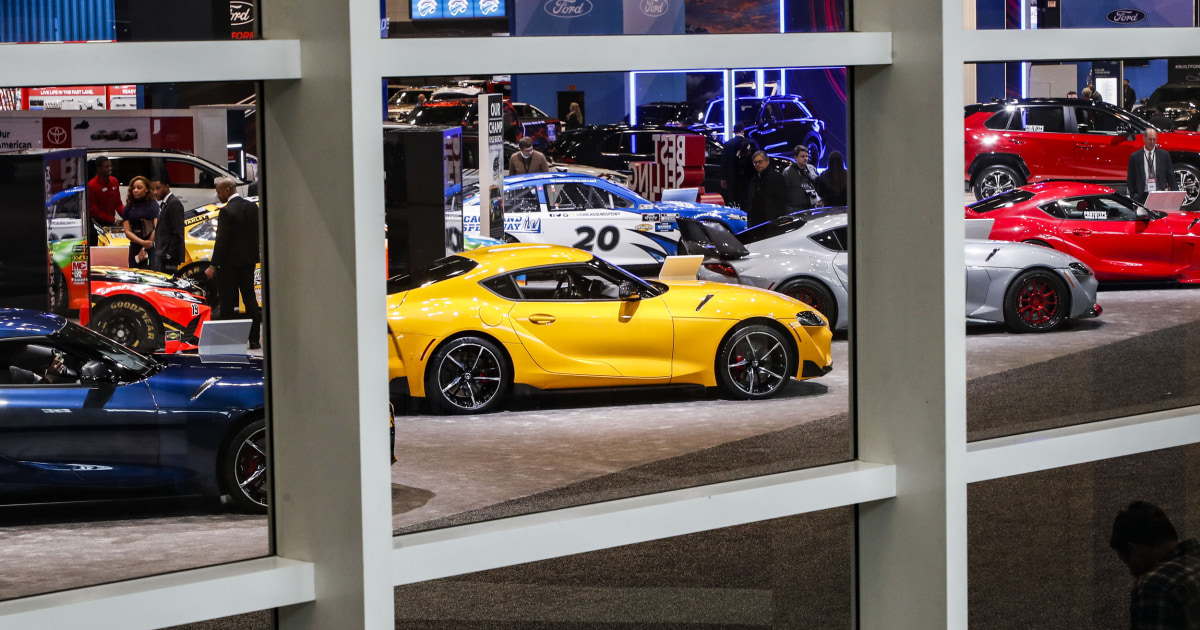
The Chicago Auto Show returns to the Windy City’s McCormick Place convention center this week, becoming the first major car show outside of China since global Covid-19 lockdowns began last year. But many industry insiders are questioning whether traditional car shows will ever fully recover — not only from the pandemic, but from other changes sweeping through the automotive industry.
It's the country's largest and longest-running auto show, dating back to 1901. But this year, the event has not only been delayed, but downsized and shortened. It has been moved to a smaller section of the convention center, will run just five days, rather than the regular 10, and tickets are only available online.
The revival of the show has been well received — with caution — within the auto industry. Since Covid restrictions began, automakers have had to rely on virtual previews of the dozens of new cars, trucks and crossovers that have been launched during the pandemic.
Even after the pace of national vaccination efforts began to pick up early this year, there were questions as to whether any auto show would be held in 2021.
“We (were) working with McCormick Place officials for months on an opening plan,” said Chicago Auto Show General Manager Dave Sloan. “We just needed to get smaller and shorter and we knew some automakers would take a pass.”
That includes mainstream brand Hyundai, and high-line marques Mercedes-Benz and Genesis, at a Chicago show covering just 500,000 square feet of space, down from the normal 1 million.
Organizers have announced plans for relaunching shows in New York, Detroit and Los Angeles this year, though all have also been downsized to varying degrees. The Motor City event, temporarily renamed Motor Bella, will be held at a small race track 25 miles north of its normal home at the TCF convention center in Detroit.
Even before Covid hit, there were strong signs of change within the auto show circuit, both in the U.S. and abroad. Some automakers have been paring back on their auto show presence or pulling out entirely. Public attendance has also dropped substantially, though by how much has varied from one show to the next.
Turnout was so poor, among both the industry and the public, that organizers of the Frankfurt Motor Show decided that the 2019 event would be their last. Many observers question the viability of Europe’s two other major shows in Paris and Geneva, the latter barely avoiding bankruptcy in 2020 when it was canceled days before opening, due to the pandemic.
Looking beyond 2021, and an auto show circuit still struggling with Covid restrictions, there are plenty of questions about what these once-popular events will look like going forward.
From a manufacturer’s perspective, “the pandemic is getting us to reevaluate things the way we didn’t before,” Rob Moran, head of media relations for Mercedes-Benz in the U.S., told NBC News. “Our eyes are open to many different opportunities. Now is a chance to balance digital and traditional,” he added.
There are some clear advantages. Even the slickest online events cost a fraction of what manufacturers will spend on a single major auto show. Simply to set up a small stand at an event like the North American International Auto Show in Detroit will cost more than $1 million, industry planners told NBC News. A large stand, along with a news conference, can run north of $5 million. Repeat that at a half dozen big events and that can put a big dent in a corporate marketing budget.
On the other hand, digital previews do have their limitations, especially if a company wants to give potential buyers a chance to kick the tires. According to Foresight Research, nearly 70 percent of adults who visit the Chicago Auto Show are in the market to purchase a vehicle within 12 months.
Automakers and auto show organizers alike are looking at the classic formula to see if there are ways to bring these events into a new era.
“(Car) shows have their place and they’re important, but you can’t keep doing it the same way,” said Rod Alberts, head of the Detroit Auto Dealers Association, the group that organizes the Detroit show.
There’s a general consensus that manufacturers will become more choosey when it comes to staging auto show media previews. At the same time, shows like Detroit and Chicago are looking for ways to better engage consumers. They’re less interested in static displays, said Alberts, and Chicago’s Sloan agrees.
"It’s all about the consumer. We’re trying new things,” Sloan said, noting how automakers are offering potential buyers an opportunity to actually drive some of the products on display — both Ford and Jeep have set up customized dirt test tracks to try out their latest SUVs.
Ultimately, the auto shows that can demonstrate the ability to keep drawing in the public — and then translate attendance into sales — will have the best chance to continue winning manufacturers’ dollars.
Article From & Read More ( Chicago's famed auto show is back — but have pandemic fallout and industry shifts killed the car show for good? - NBC News )https://ift.tt/2Ug43yf
Auto
Bagikan Berita Ini














0 Response to "Chicago's famed auto show is back — but have pandemic fallout and industry shifts killed the car show for good? - NBC News"
Post a Comment